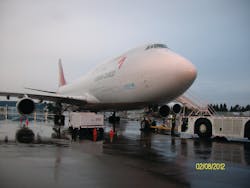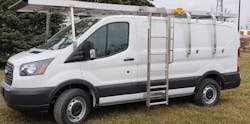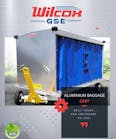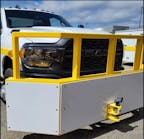Want to work on the ramp for Matheson Flight Extenders? They're an up-and-coming ground handler that definitely wants to expand.
And because they do government work (more on that in a bit), many of their 16 ramp and warehouse operations around the country honor the prevailing wage so you might start out by earning more than a few extra bucks an hour compared to other ground handlers that have been in the business longer and may have greater name recognition than Matheson.
Just be prepared for a little more work before you even start work.
"We're strict and demanding," says Tom Tagart, manager, operations and safety. "But we're not afraid to invest the time in the individuals to train them."
Tagart told us the initial selection of the right individual is key. If you make the first cut, the company will conduct a criminal background check, a drug screen and then check your personal references.
Then get ready to head to the "gym."
"We have to know whether you are fit enough to do the job," Tagart explains, "so we have a 'functional capacity' test that requires you to lift weights of up to 70 pounds."
Sounds reasonable enough. After all, working on the ramp is tough work. But you're also going to need brains to go with the brawn.
"Your first day is an eight-hour orientation in which we tell you who we are as a company; what our goals are; and how we measure your performance," Tagart adds. Afterward, there's some basic OSHA, fire and general warehouse and ramp safety instruction.
So now you can get to work, right? Well, yes and no.
"When you do report for duty on the first day, you're placed with a mentor," Tagart says. "You stick with this mentor for the next two weeks." In that time, there'll be on-the-job training to learn, for example, how to secure cargo and inspect ULDs.
You want to drive a tug? Fine, but plan on another eight-hour day where you'll first review operations and driving manuals, and then get your chance to run an obstacle course.
"We'll start you off with just the tug," Tagart says. "And then we'll add one cart ... and then two carts ... and then three and four. You must prove the ability to maneuver in tight spots. Knock over anything and you wash out."
But if you pass the obstacle course, you're all set, right? No. After that first step, there's training on pre-work and post-work inspection of the tug. You'll learn to test the brakes, for example, and make sure the hitch is correct. Tagart says all this will likely add up to 16 hours of training.
Now you can get behind the wheel, right? No. You'll ride along with your mentor for a while and then, you finally get the chance to get behind the wheel – but only as long as the mentor is riding alongside to play the role of front-seat driver.
"By the time we do turn you loose on the ramp," Tagart says, "there is a great deal of trust placed on you."
Of course, that's still just the start ... of the start. If you slip up, the company will pull your credentials, and you'll need to re-do all the classes and training you spent hours going through.
That's a pretty thorough training program considering Matheson Flight Extenders didn't have much of a presence at any airports until 2001 and didn't get what most in the ground support industry what most would consider a major contract until last summer. And one more thing. The business owes much of its current success to working with a long-time customer – the United States Postal Service.
TRUCKING DNA
"Our DNA is in the trucking business," says Paul O'Donnell, vice president of business development.
Matheson Inc., currently based in Sacramento, CA, started out life as R.B. Matheson Trucking Inc. in 1962 and began operations with a single water truck. Two years later, company founders Robert and Carole Matheson purchased another trucking company that had two highway contract routes with the USPS.
Four decades went by as the company expanded the trucking business, but also diversified with a forklift sales and service operations, a full scale truck repair center and, somehow or another, even got into the firewood business.
In 1968, Matheson bought Flight Extenders Inc., a company specializing in aircraft tip tanks. You read that. A flight extender is a fuel tank typically added to the wing tip of general aviation aircraft.
Through all this diversification, the company's bread-and-butter trucking operation – by this time named R.B. Matheson Postal Service – was winning contract after contract to transport the mail for the USPS, plus growing through acquisition of other fleet operators that were hauling the nation's mail.
By 1996, Flight Extenders started taking on its current form by providing terminal handling and mail sort operations for the USPS in Phoenix. A year later, Flight Extenders expanded to aircraft ground support operations for the USPS.
Finally, in 2001 came the big change for Flight Extenders. The USPS decided to outsource its airport-related operations and awarded Flight Extenders with a terminal handling services contract for 13 airport locations, primarily across the Western United States.
With plenty of work from the USPS, Matheson stated expanding its ground support business.
"By this time we'd worked for the USPS since 1964," O'Donnell adds, "Now here we were at or near these airports and we had a change to do more."
In 2003, Flight Extenders became the only private contractor to FedEx to provide aircraft ground support services in Billings, MT. Also that year, its Seattle, WA, operation began providing aircraft support to Northern Air Cargo. By 2004, Alaska Airlines contracted with Flight Extenders to provide terminal handling services also at Seattle.
Between 2004 and 2006, Flight Extenders acquired more contracts with Airborne Express; DHL; and UPS for ground support services and terminal handling services in new cities in the Western United States, as well as Arizona to further support the USPS.
THE POST OFFICE?
Set aside the Post Office jokes we've all heard. Matheson says doing business with the USPS is a very serious matter.
"We're very good at doing things that are hard," O'Donnell explains. "And we're very good at doing things that other company don't like to do."
The USPS constantly measures and grades its business partners on a host of service quality metrics, which, in its own words, "must be reliable and convenient, and must improve continuously."
"The USPS is very professional and high-standards partner," O'Donnell adds. "At a minimum, the USPS expects a performance level of 98.5 percent. We deliver a 99.5 percent level."
O'Donnell outlined some of those performance measurements for us. Trust us: there are many. But essentially it all means that the mail moves with very little room for mistakes or misunderstandings.
"They're the kind of customer that you can really learn from," O'Donnell adds. "Thanks to the USPS business, we've really built hyper-efficient systems and trained our people accordingly to deliver great customer service."
It's that commitment to quality that recently helped the company win its first international contract with South Korea's Asiana Airlines Inc. last year to offer ground handling service to three weekly 747-400 cargo flights at Flight Extenders Portland, OR, facility.
"Asiana is very conscious of their cargo," O'Donnell says. "We went through a very rigorous process to win the business, and I know that our consistent high marks for service to the USPS is what they liked about us, even though ostensibly, we didn't have as much experience in commercial cargo as other handlers did who were also bidding for the job."
The training that Tagart described at the start of our story goes for all the company's Flight Extenders operations – for all its trucking operations, too, for that matter.
However, he also outlined what the company did to make sure this new operation got off the ground without a hitch.
"The local manager had a lot of experience with 747 cargo, but not so much with a start-up operation," Tagart says. "There are a lot of things to consider, and we figure that we have about 175 years worth of collective cargo and ramp experience throughout the company."
So the company had the Seattle manager – experienced in commercial carriers – and the Hartford, CT, manager – experienced in cargo – and the Salt Lake City, UT, manager – experienced in GSE – head to Portland to prep two weeks before the arrival of the first Asiana flight.
By the way, we can't write this feature without mentioning that Hartford manager. Kenneth DeVolpi got the ball rolling for us on our coverage – despite the fact that when we first spoke to him he was literally on his way to the emergency room. Later, we spoke to him as he recuperated on the couch at his parent's home in Dallas, TX.
"We're the little guy that your magazine started out to serve," he told us. "We're trying our best to grow Flight Extenders even though we're going up against the big guys whose names people know more than ours right now."
We liked his passion, and we're glad that we actually met him and Tagart at our recent Cygnus Aviation Expo.
"Communication is key," Tagart told us. "That way we know how we'll do relative to what Asiana wants us to do. We monitor that and take it very seriously."
Asiana also operates flights at other Flight Extenders locations. The airlines said upfront that they will carefully evaluate the Portland operation to determine if they will make a switch.
"We have very open lines of communications," Tagart adds. "We're always talking a lot with our staff about our performance standards – that we want to run effectively and efficiently and show a profit on the bottom line."
For the customer, Tagart says the clear communications extend not to just what they've done right, but also what didn't go according to plans.
"We'll provide them with the corrective action that we'll take to fix it," he adds.
Back at the corporate offices, O'Donnell will also be keeping a sharp eye on the Asiana contract.
"It's great to see that the high-quality systems and service that we've built into our company do translate well and are appreciated in commercial business like Asiana," O'Donnell says. "We believe there is quite a future for us there to grow."





